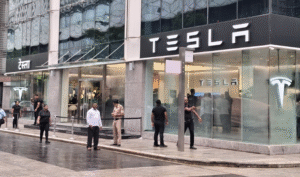The uneasy alliance between tech mogul Elon Musk and former U.S. President Donald Trump just hit another boiling point. In a public outburst last week, Trump lashed out at Musk, declaring, “Maybe he should go back to South Africa,” while threatening to strip federal subsidies that benefit Musk’s companies. The comment—sharp, personal, and politically charged—sent shockwaves through both the tech and political communities.

The attack comes on the heels of a highly publicized May meeting in Saudi Arabia, where the two men appeared side by side at a royal palace, welcomed by Crown Prince Mohammed bin Salman. The Riyadh gathering had all the optics of unity: handshakes, golden swords, and billion-dollar promises. Musk was there to pitch Tesla’s latest tech, including Optimus humanoid robots, and celebrate Starlink’s official approval in the Saudi market.
So how did things sour so quickly?
Trump’s South Africa remark isn’t just xenophobic dog-whistling—it’s a calculated move in a political chess game. As he amps up rhetoric ahead of the 2024 U.S. elections, Trump is trying to reclaim his “America First” image by targeting big tech, government subsidies, and globalists. Musk, despite being an ally on certain policy issues, has become a convenient foil.
“I gave him more subsidies than anyone,” Trump said during a recent rally. “And now he turns on me? Maybe he should go back to South Africa.”
Musk, born in Pretoria, South Africa, in 1971, moved to the U.S. in the mid-1990s. Today, he’s an American citizen and CEO of multiple U.S.-based companies including Tesla, SpaceX, and X (formerly Twitter). The implication that he’s not “American enough” struck many as both politically desperate and personally offensive.



